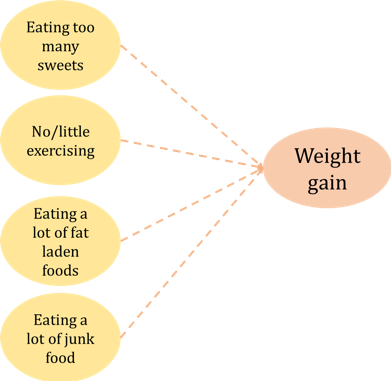In GMAT CR, connectives like “if….then”, “whenever”, “anytime”, etc., imply the presence of a condition or a requirement. Confusion is created when we do not have clarity about what kind of a condition these connectives represent. In our previous article, we have already discussed the nature of – a necessary but not sufficient condition. In this article, we’ll learn about the second category of conditions and answer the question – “What are sufficient but not necessary conditions?“. The purpose of this article is to make ourselves comfortable with this category of conditions and to understand the implications of such conditions when presented in a Critical Reasoning argument.

What are Sufficient but not Necessary Conditions?
2.1 Definition
A “sufficient” condition is one which “guarantees” that the outcome will take place.
For e.g., If you eat too many sweets, you will gain weight.
What does this sentence convey?
It lays down a requirement, fulfillment of which is sufficient for gaining weight – It says that eating a lot of sweets is definitely going to lead to weight gain.
Thus, the fulfillment of a Sufficient Condition is guarantee enough of the outcome.
Having sound concepts to acing the GMAT. We can help you with quality online content to prepare. We are the most reviewed GMAT prep company on gmatclub with more than 1825 reviews (as on May 25, 2019). Why don’t you take a free trial and judge it for yourself? Write to us at acethegmat@e-gmat.com in case of any query.
2.2 Is a sufficient condition the only means to achieve the outcome?
Alright, so we saw that satisfying a sufficient condition will ensure that the outcome is achieved.
However – “Is a sufficient condition the only condition in order to achieve a particular outcome?”
Let’s think along the lines of the ‘weight gain’ example. Will weight gain take place only if one eats a lot of sweets?
Not really!! We are not given that eating too many sweets is the only way to gain weight.
760 on the GMAT corresponds to 99 percentile. What does 740 correspond to? Understand GMAT scores and percentiles in this article.
2.3 Another Question – Is a Sufficient Condition Also a Necessary one?
The answer is pretty much similar to what we have discussed in the previous section.
A sufficient condition is only one of the means to achieve a particular outcome. This means that there could be other means to achieve the outcome. Therefore, a sufficient condition is not necessary to be fulfilled in order to achieve the desired outcome.
Again, let’s think along our weight gain example to reaffirm our understanding.
Does one have to necessarily eat too many sweets to lead to weight gain? Not really!
As discussed previously, there could be other reasons that could lead to weight gain.

The statement If you eat too many sweets, you will gain weight does not mean that one cannot gain weight through other means.
There can be alternate causes that can lead to weight gain
As discussed, One may eat a lot of fat-laden products and consequently, gain weight.
One might gain weight by not exercising enough.
So, while the given condition of eating too many sweets is a sufficient one to gain weight but by no means is it a necessary one. The occurrence of the result might take place by the fulfillment of similar other sufficient conditions.
2.4 Last Question – What can/cannot be inferred when a Sufficient Condition is given?
So far, we understood that a sufficient condition is not always necessary for the outcome to occur.
i.e., when we are given “If X is done, then Y occurs.”, then X is not the only way for Y to occur.
But what else can we infer from the information ‘If X is done, then Y occurs.’?
Firstly, we can definitely say that whenever X is done, Y must also occur. This can be definitely inferred.
However, can we say the same holds true for the converse? i.e., if Y has occurred, can we infer that X must have been done?
Not really! As discussed before, X is not the only way for Y to occur.
Again, think along the lines of the weight gain example.
If you have gained weight. then we cannot infer/conclude that you must have had too many sweets. (You could have gained weight for any of the many other reasons such as a sedentary lifestyle, eating fatty foods, etc.)
Therefore, the occurrence of the outcome is not a guarantee of a sufficient condition being fulfilled.
Impressing an admissions committee with your application is a guarantee of securing an admit. Learn the dos and don’ts of impressing an admissions committee.
2.5 Simple Example – Sufficient but not Necessary Conditions
Now let’s put our learnings in the context of some simple examples.
2.5.1 Example 1
If it rains, then Michelle carries an umbrella

This statement indicates that the occurrence of rain is a sufficient condition for Michelle to carry an umbrella
- If it is raining, one can safely infer that Michelle will have an umbrella with him.
- But at the same time, if Michelle is carrying an umbrella, then we cannot infer/conclude that it must be raining.
The occurrence of rain is sufficient for Michelle to carry an umbrella. However, this does not mean that Michelle will carry an umbrella only when it rains.
Michelle could carry an umbrella because of other reasons:
- She could carry an umbrella when the sun shines hard and therefore it is hot.
- She could be suffering from a migraine, which is triggered by the sun, and therefore could carry an umbrella.
Each of these scenarios could be sufficient conditions – individually – for Michelle to carry an umbrella, but by no means is any of the conditions a necessary condition, a minimum condition that has to take place for Michelle to carry an umbrella.
Thus, rain is a sufficient but not necessary condition for Michelle to carry an umbrella
2.5.2 Example 2
If Ronaldo plays against Barcelona, Real Madrid will definitely win.

What can be inferred from this statement?
- Ronaldo playing against Barcelona is definitely going to lead to a win for Real Madrid.
This means, given the current situation Real Madrid will win if Ronaldo is playing against Barcelona. Ronaldo’s presence in the team is sufficient to ensure that Real Madrid will win.
What cannot be inferred from this statement is
- If Real Madrid won the match against Barcelona, then Ronaldo must have definitely played.
Or
- The only way for Real Madrid to win is if Ronaldo plays
Let us say in a particular season, Real Madrid won against Barcelona. From this can one infer that Ronaldo had played against Barcelona in that match?
Not at all!
The match could have been won even without Ronaldo playing against Barcelona.
Maybe some other player scored numerous goals to make the goal tally higher than Barcelona’s.
Maybe Barcelona did not play as well as expected that day and lost to Real Madrid.
So, in the above argument, Ronaldo playing against Barcelona is a sufficient condition but not a necessary condition. His playing guarantees the win, but it is not the only condition required for Real Madrid’s win. Even when Ronaldo is not playing Real Madrid can win.
2.5.3 Example 3
Whenever there is a shortage of water, the yield of rice crops gets hampered.

What can be inferred from this statement?
- When there is a scarcity of water, the yields from the rice fields will be low.
So, an inadequate water supply is enough to guarantee low yields from the rice crop. i.e., water scarcity is a sufficient condition on its own to bring about a bad impact on the yield of rice.
What cannot be inferred from the statement is
- If the yields from the rice fields were low, then there must have been shortage of water for that particular seed time.
Let us say that in a particular year, the yields from the rice fields was very low. From that, we cannot infer that the reason behind the low yields was water shortage. It is possible that the yields were low that year despite no water shortage. Maybe, the fertilizers used that year were not effective or a new variety of seeds were used but did not give desired results. Therefore, water availability may not be the only cause behind a bad yield of rice.
Thus, water shortage is one of the sufficient but not necessary conditions that hamper the yield of rice. Even without water being scarce, rice crops may give low yields.
2.6 Full-Length Questions (Official and Unofficial)
In GMAT we often have arguments that end in conditions being laid down by the author. And the selection of the correct option depends entirely on our understanding of what that condition implies. Answer choices appear to be very confusing if we do not have clarity about whether the condition is sufficient one or a necessary one.
For e.g., when a sufficient condition (such as If X then Y) is given in the passage:
- An incorrect answer choice for a weaken question could mention another sufficient condition to achieve the outcome
- If Z (without X) then Y
- Similarly, an incorrect answer choice in an inference question could say:
- If the sufficient condition is not fulfilled, then the outcome will not be achieved.
- That is, If not X, then not Y
- If the outcome is achieved, then the sufficient condition must have been fulfilled.
- => If Y happened, then X must have happened.
Let us look at some full-length questions which have a “sufficient but not necessary condition” as a part of its conclusion and incorrect choices as mentioned above.
Take a look at the review of Official guide 2019 and decide whether is it worth buying.
2.6.1 Example 1 (GMAT PREP)
Twelve years ago, and again five years ago, there were extended periods when the Darfir Republic’s currency, the pundra, was weak: its value was unusually low relative to the world’s most stable currencies. Both times a weak pundra made Darfir’s manufactured products a bargain on world markets, and Darfir’s exports were up substantially. Now some politicians are saying that, in order to cause another similarly sized increase in exports, the government should allow the pundra to become weak again.
Which of the following, if true, provides the government with the strongest grounds to doubt that the politicians’ recommendation, if followed, will achieve its aim?
- Several of the politicians now recommending that the pundra be allowed to become weak made that same recommendation before each of the last two periods of currency weakness.
- After several decades of operating well below peak capacity, Darfir’s manufacturing sector is now operating at near-peak levels.
- The economy of a country experiencing a rise in exports will become healthier only if the country’s currency is strong or the rise in exports is significant.
- Those countries whose manufactured products compete with Darfir’s on the world market all currently have stable currencies.
- A sharp improvement in the efficiency of Darfir’s manufacturing plants would make Darfir’s products a bargain on world markets even without any weakening of the pundra relative to other currencies.
2.6.1.1 Passage analysis
The passage talks about pundra, Darfir’s currency.

Historical precedence has been provided here about a certain observed relationship between the value of pundra and the export of Darfir’s manufactured goods.
Twice in the past, an unusually weak pundra made Darfir’s manufactured goods cheap in the world markets. As a result, the exports increased on both occasions.
Now, certain politicians are using the two instances in the past to set up a goal in the present.
The goal is – Similar increase in exports
The plan is – Make the pundra weak again.
The conclusion therefore is:
If pundra is made weak, exports will rise.
Thus, the weakening of the pundra has been considered as a sufficient condition to achieve an increase in exports.
The politicians clearly suppose that history will repeat itself and things will happen in the same way as they had happened in the past.
Therefore, one way to weaken the politicians’ recommendation is to show that the situation is no longer the same anymore for their plan to work
2.6.1.2 Correct answer choice analysis
Option B is an interesting choice.
It says for many decades Darfir’s manufacturing sector was producing way below its ability to produce goods. But now the units are working almost at their peak levels or maximum capacity to produce. Which means at present the scope for increasing production is almost nil and even if pundra is made weak, the exports cannot be increased because production cannot be further increased.
This weakens the recommendation. It shows that the situation has changed and the recommendation may not lead to the desired results any longer.
It follows the idea of “If X then Y” and weakens it by saying “If X, then not Y”
Close but incorrect choice
Option E
It appears to weaken the recommendation but does not really weaken the underlying condition of sufficiency.
In fact, this option offers an alternate cause for achieving the goal. And is, therefore, a tempting but incorrect choice.
- It moves away from the structure of “If X, then Y”.
- It also says even with Z (alternate cause), Y (increase exports) is possible.
- And, it calls for improving the efficiency of Darfir’s manufacturing plants to make goods cheaper in the world markets, without weakening the pundra.
Or in other words, Y can happen without X
And as we learned previously, a sufficient condition does not mean that other conditions are not present.
But does it actually weaken the recommendation of the politicians?
Not really!
This option does not show that the recommendation will not work. Rather it shows that there are other ways of achieving increase in exports without actually showing that a weakened pundra will not achieve increase in exports.
2.6.2 Example 2 (e-GMAT’s Proprietary Question)

As the brain grows older, dendrites – the antennas by which neurons receive information from other neurons – begin to shrink, thereby reducing the communication capability between neurons and hence our ability to learn new things. Increasing the mental activity of the brain has shown to reverse the shrinking of dendrites.
Which of the following can be most logically concluded from the statements above?
- If mental activity of brain increases with aging, then the ability to learn new things as the brain grows older might not reduce considerably.
- A brain that is mentally more active as it ages has higher potential to learn new things than the brain of same age that reduced its level of mental activity.
- Individuals whose mental activity levels do not increase as they grow older are likely to experience a decline in learning ability
- By increasing one’s mental activity, it is possible to continuously increase one’s ability to learn.
- Dementia, a disease that stems from mental decline, is much more likely to develop in individuals who lead a sedentary life as they grow old than in those who don’t.
2.6.2.1 Passage Analysis
The passage explores the relationship between the mental activity of the brain and the shrinking of dendrites as the brain ages.
Per the passage, as the brain ages, dendrites begin to reduce in size.
These dendrites are the antennas used by neurons to transmit information among themselves.
So, as the dendrites shrink, there is a decrease in the capacity for communication between neurons which in turn leads to a decrease in the ability to learn new things.
If the mental activity of the brain is increased=X
Then, the shrinking of the dendrites can be reversed=Y
Which means:
An increase in mental activity of the brain =X
slows down the decrease in the ability to learn things =Y
2.6.2.2 Correct answer choice analysis
Option A
If mental activity of brain increases with aging, then the ability to learn new things as the brain grows older might not reduce considerably
We know that:
- The ability to learn new things reduces along with age.
- This decrease in ability to learn new things is related to the decrease in size of dendrites.
- Increased mental activity has the propensity to reduce the dendrite shrinkage.
So, essentially, increased mental activity has the capacity to slow down the decrease in the ability to learn things
Close but incorrect choice
Option C
Individuals whose mental activity levels do not increase as they grow older are likely to experience a decline in learning ability
This option looks tempting because it also draws a seemingly similar but reverse relationship between the level of brain activity and the ability to learn new things by a brain.
But there is a change here.
Instead of X, we have a “not X” = no increase in level of mental activity.
And instead of Y, we have a “not Y” = no slow-down in the brain’s ability to learn new things
This creates confusion because the passage presents the relationship “If X, then Y”.
And so, we feel the reverse should also be true, i.e., If not X, then not Y”
But this is where we go wrong.
As discussed in our examples, there could be other ways in which the ability to learn new things could be increased even without an increase in the mental activity of the brain.
For example, there could be stimulants/drugs which when taken, could help in improving the brain’s ability to learn new things.
Hence, this answer choice is incorrect.
Takeaway – Sufficient but not Necessary Conditions
When we are looking at passages in which the outcomes depend on certain conditions, then it is important for us to be able to evaluate whether those conditions are sufficient or necessary.
As discussed above a “sufficient” condition is one which “guarantees” that the result will take place, but it is not a necessary condition that has to be fulfilled for the result to occur.
Terms such as if, whenever, anytime, etc., indicate the presence of a condition that is on its own sufficient, and they act as guides to our understanding the implications thereof.
Hence, one needs to read the entire passage carefully to determine the presence of “sufficiency” or “necessity” and apply the understanding accordingly.
Through the use of simple and easy to follow examples, the article helps us to have a better understanding of a sufficient condition and its implications. We also get to know why a sufficient condition is not always a necessary condition. The OG examples give us an overview of the kind of language used to present sufficient but not necessary conditions
From this article, we have learned the following:
- How to identify whether the condition presented is a sufficient one but not a necessary one
- How to apply the understanding of the above to analyze the passage and the answer choices in the context of the passage.
Recognizing that a condition is a sufficient but not necessary condition helps one in eliminating the incorrect and often misleading answer choices. Saves time!! Improves accuracy!
If you are planning to take the GMAT, we can help you with a personalized study plan and give you access to quality online content to prepare. Write to us at acethegmat@e-gmat.com. We are the most reviewed GMAT prep company on gmatclub with more than 2400 reviews and are the only prep company that has delivered more than 700+ scores than any other GMAT club partner. Why don’t you take a free trial and judge for yourself?












